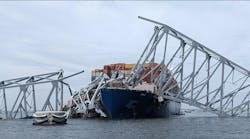If you're a regular reader of the “Police Blotter” section in your local paper, you've probably read many items involving a cop stopping some poor slob because the slob's license plate light was burned out. Almost invariably, upon getting a better look at this mug the cop realizes there's a lot more going on inside the car that deserves his attention—and the attention of Police Blotter readers.
If you can't relate to such slobs, you may have an opportunity to—especially if your company is based in OSHA's Region 4, which includes Alabama, Florida, Georgia, and Mississippi. The Region 4 office recently issued a press release to each of these states announcing a new emphasis program focused on reducing fatalities and serious injuries related to powered industrial trucks—industry's favorite off-road motor vehicle. Apparently OSHA has been noticing a rise in these incidents and decided it was time to nip it in the bud.
The announcement encourages employers to bring their facilities into compliance with OSHA standards.
“Powered industrial trucks are a significant source of serious and fatal injuries to workers,” said Cindy Coe, OSHA's regional administrator in Atlanta. “Employers are responsible for ensuring that workers follow the proper safety procedures and for eliminating hazards from the workplace.”
What's new about this emphasis, and the reason it reminded me of that broken license light, is that now when OSHA is called in on a complaint from someone working at a site in Region 4—even if the complaint doesn't involve a lift truck—that inspector will want to get a look at that employer's lift truck operations anyway. The inspection will focus primarily on the training operators receive, maintenance and repair, and the pathways the trucks travel to ensure clear visibility and to determine any possible struck-by hazards.
I called Ben Ross, assistant regional administrator for enforcement programs in OSHA's Atlanta Region 4 office and asked what precipitated this new emphasis on lift trucks. He said OSHA has noticed a slight rise in the number of citations issued for powered industrial truck violations.
“OSHA is very aware that citations issued for violations involving powered industrial trucks still rank in the top 10,” he said. “As a result of that we want to make sure that all employers remain vigilant in terms of their obligation to ensure they're being compliant with the requirements of the OSHA standard as it relates to powered industrial trucks. Also we're still seeing instances where there is a lack of vigilance in this area and because of that we believe this initiative will go a long way to alert those who may not even get an inspection from OSHA—that by the sheer fact that we announced this through our press releases and are making a push in region 4 they will be more proactive and ensure their facility is fully compliant.”
Mr. Ross's belief is based on experience. He noted that not long ago OSHA did a local emphasis program on powered industrial trucks used in the textile industry due to an increase in the number of accidents involving lift trucks. The following year, Ross reported, there were no fatalities in that industry thanks to the initiative.
If this is such a successful tactic, I asked him, what are the chances of the emphasis going national?
“I don't know if it will go national,” he answered. “We just started it, and at the end we will do an evaluation to determine the impact in region 4. Once we get that data together we will report that to our national office and they will have the option of making that decision themselves. If any of the other 9 regions looks at the data and sees that we had a tremendous impact and they're looking at safety and health the same way we are, they may implement a similar program in their region or one of the area offices may implement a local emphasis program to address the issue in the jurisdiction.”
The region 4 emphasis program began on May 29 and will continue until September 30, 2012, unless it is extended. I'll be interested to see how many inspections that were precipitated by something outside a lift truck fleet manager's watch result in the discovery of one of those chronic problems that keeps powered industrial trucks on OSHA's Top 10 violations list. Hope you're interested too—and will do your part to make that list less interesting.


